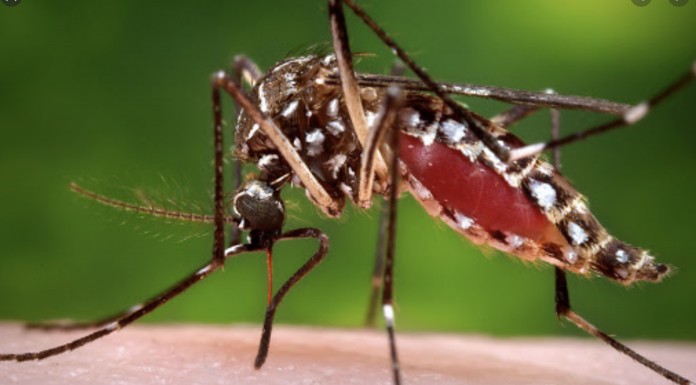 Do you trust the judgment of scientists who would inject the world’s deadliest animal, the mosquito, with a virus that has spread to every contintent, killing hundreds of thousands? Comment below.
Do you trust the judgment of scientists who would inject the world’s deadliest animal, the mosquito, with a virus that has spread to every contintent, killing hundreds of thousands? Comment below.
Scientists ask, ‘can mosquitoes spread the coronavirus?’ So they inject them with the virus just to check.
Aug 25, 2020
AP – While mosquitoes can spread some diseases, most notably malaria, experts say COVID-19 is not among them.
The U.S. Centers for Disease Control and Prevention says it has no data to suggest the coronavirus is spread by either mosquitoes or ticks. COVID-19 is mainly spread from person to person through droplets people spray when they talk, cough or sneeze.
And the World Health Organization says a mosquito bite won’t give you the virus.
But why not, if mosquitoes can transmit other diseases? A recent study offers an explanation.
Researchers say the virus would have to infect the mosquito and multiply inside of it in order for the mosquito to pass it on to people.
That failed to happen when researchers injected three species of mosquitoes with the virus.
___
BAD-IDEA LAB: IT’S NOT THE FIRST TIME
How deadly pathogens have escaped the lab — over and over again
Research into dangerous viruses and bacteria is important, but for the deadliest pathogens, it’s not clear the benefits are worth the risks.
Vox, Mar 20, 2019 – All over the world, bio research labs handle deadly pathogens, some with the potential to cause a pandemic. Sometimes, researchers make pathogens even deadlier in the course of their research (as Science Magazine reported last month, the US government just approved two such experiments after years of keeping them on hold) … Read more.
Chinese pandemic was a lab mistake
The danger of a manmade pandemic sparked by a laboratory escape is not hypothetical
Slate, Apr 11, 2014 – The public health danger posed by potentially pandemic-causing viruses escaping from laboratories has become the subject of considerable discussion, spurred by “gain of function” experiments. The ostensible goal of these experiments—in which researchers manipulate already-dangerous pathogens to create or increase communicability among humans—is to develop tools to monitor the natural emergence of pandemic strains. Opponents, however, warn in a variety of recent research papers that the risk of laboratory escape of these high-consequence pathogens far outweighs any potential advance.
The danger of a manmade pandemic sparked by a laboratory escape is not hypothetical: One occurred in 1977, and it occurred because of concern that a natural pandemic was imminent. Many other laboratory escapes of high-consequence pathogens have occurred, resulting in transmission beyond laboratory personnel. Ironically, these laboratories were working with pathogens to prevent the very outbreaks they ultimately caused. For that reason, the tragic consequences have been called “self-fulfilling prophecies … ” Read more.
SARS escaped Beijing lab – twice
Laboratory safety at the Chinese Institute of Virology under close scrutiny
The Scientist, Apr 25, 2004 – The latest outbreak of severe acute respiratory syndrome (SARS) in China, with eight confirmed or suspected cases so far and hundreds quarantined, involves two researchers who were working with the virus in a Beijing research lab … ” Read more.
Do you trust the judgment of scientists who would inject the world’s deadliest animal, the mosquito, with a virus that has spread to every contintent, killing hundreds of thousands? Comment below.
RECENTLY:
Gov. Cuomo’s New Book Offers ‘Leadership Lessons’
‘Jurassic Park Experiment’ Takes Wing In Florida Keys
The Coronavirus Was Not Engineered In A Lab. Here’s How We Know.



